

We Were Mentioned in Metal Hammer Magazine!
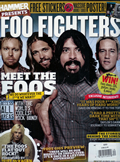
Dave with his Fans (Photos)
Check out our current photos of Dave with his fans
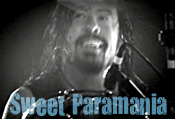



Check out our current photos of Dave with his fans

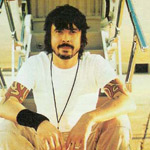
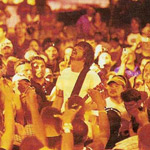
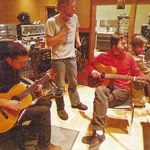
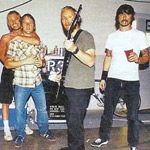
The images below were in the Austalian Issue of Rolling Stone accompanied by same article/interview Dave had the cover in the Australian issue!
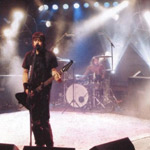
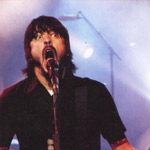

|
It's midnight, and 30,000 feet above New Mexico, with his back facing the cockpit of a private plane, Dave Grohl kicks back in his plush leather seat and takes a celebratory sip of Crown Royal. The smoke from a Parliament in his left hand wafts through the small cabin, where a Police compilation pipes through the speakers. Four days after the release of their double album In Your Honor , the Foo Fighters -- Grohl, drummer Taylor Hawkins, bassist Nate Mendel and guitarist Chris Shiflett -- are winding down an ambitious promotional tour, and Grohl ought to be exhausted. This morning the band flew to Roswell, baked all day at 100-plus degrees in an airplane hangar -- near the alleged site of a UFO crash that many believe happened in 1947 (the band's name refers to Forties Air Force slang for UFOs) -- to perform for hundreds of fans and contest winners chartered in from around the country. To Grohl, sleep is unproductive, and he's riding high on tonight's performance, carrying on conversations about the fact that he hasn't done drugs in fifteen years, about the greatness of Stewart Copeland, and he laughs about the meager sum at the bottom of his latest Nirvana royalty check. Like many of the Foos' special trips, the journey from Los Angeles to Roswell is a family affair: Grohl's wife of two years, Jordyn, hangs out in the back of the twelve-seat Cessna with Hawkins and his fiancee, Alison Williams; Virginia, Grohl's mom, is plopped down in the back lounge. "My parents worked really hard to raise me," Grohl says. "So if I can return any of that favor, I do. Most of our parents are retired, so if we go to Reykjavik or Japan or some place they've never been, better to do it with us than some crusty fucking tour group that gives everyone diarrhea." Independence Day marked the tenth anniversary of the Foo Fighters' first release, recorded in less than a week and played entirely by Grohl except for a Greg Dulli guitar part on the song "X-Static." "The first record was such a fluke," he says. "Had I taken it more seriously, I would have spent more than five days making it." But Foo Fighters eventually sold more than 1 million copies, and the Foos' next three albums -- The Colour and the Shape and Grammy winners There Is Nothing Left to Lose and One by One -- have improved on that first success. "I knew that I'd love to play music for the rest of my life," says Grohl, "but I never thought that it would keep the same name for ten years, that it would become what it is now. I had a profound revelation the first time we headlined the Reading Festival [in England in 2003], as I was staring at my mother and my sister on the side of the stage: that I wrote a song on the back of a fucking AM/PM receipt, and now 60,000 people are singing it. I honestly felt like the luckiest guy in the world." Grohl's parents -- both from Ohio -- met doing community theater. His mother had a beautiful voice, and his father, James, was a classically trained flutist. "He was a child prodigy," says Grohl. "In the Fifties he was really into jazz, so he had this beatnik side to him. If you mention early jazz or Kerouac or any of that shit, my dad will start telling you how Ginsberg hit on him." When Dave was born in 1969 -- three years after his sister Lisa -- James Grohl had become a journalist for the Scripps Howard News Service, getting a ringside seat to the Watergate hearings when the family moved to Virginia in the early Seventies. "Growing up in Springfield, Virginia, you're fifteen minutes from chicken farmers and fifteen minutes from the White House," says Grohl. "You could go drink Robitussin and inhale lighter fluid all week and then go into the city and see hardcore bands on the weekends." His family could never afford a drum kit, so pillows acted as drums and record sleeves were cymbals while he studied and played along to Minor Threat's Out of Step , Bad Brains' Rock for Light and Rush's 2112 . His heavy-handed drumming style was born because the only sticks he had were as thick as his arms, better suited for a marching band. "When I sat down on somebody's drum kit, I'd break everything," he says. "I'd beat the shit out of it." He painted houses one summer to earn money for his first kit. Though he still owns some of the drums, most were destroyed after Kurt Cobain repeatedly dived into them. A few days after the Roswell show, sitting in the band's state-of-the-art studio and rehearsal space in Northridge, California, Grohl opens up about his three-and-a-half-year stint in Nirvana. When he speaks about Cobain, his words slow down and his voice grows somber. Sitting in the house that the Foo Fighters built, Grohl is clearly more comfortable talking about his band, not Cobain's band. And there's good news: In Your Honor -- the half-rock, half-acoustic double album that features guest spots from Norah Jones and Led Zeppelin's John Paul Jones -- has sold more than 310,000 records in its opening week, the Foos' best debut ever. "At this point in our lives, after ten years, I couldn't have imagined making another record, another twelve songs to further the cycle," Grohl says. "And rather than make what I imagined as being our last, which is the way I always looked at it, let's make a record that opens up another ten years of albums. Why not make records forever? Because now I feel like we can do anything." Who do you blame for your sense of humor? My father. He's a great storyteller. His e-mails are fucking epic, man. After doing the journalist thing, he became one of the principal speechwriters for the Republican National Convention. He's got a way with words. Whether it was being lectured or just getting a story about Niles, Ohio, in the Sixties, it would become like a State of the Union address. It was unbelievable. As someone who toured with John Kerry last year, you must've butted heads with your dad. We never really discussed politics. I was listening to [the hardcore band] MDC when he was writing for the RNC. But when I went out on the Kerry campaign, I wondered what my father would think of it when he eventually found out. How did Kerry inspire the album title, " In Your Honor "? Well, for the rock record, I wanted there to be anthemic, fist-pumping singalongs. Not some "Pour Some Sugar on Me" bullshit. I spent last summer going to political rallies, playing acoustic music for people. We went through the Midwest in a motorcade of buses. We'd pull into these tiny little towns, and thousands and thousands of people would come out to be rescued by this man -- you could see it in their faces. The front row was World War II vets, wheelchairs and school teachers, not Foo Fighters fans. I was playing "My Hero" for people that were over eighty. But it was such a powerful emotion, feeling this collective energy. It's like watching the strength of human will, seeing that sometimes people do things for the right reasons. Or honorable reasons. It made me wanna fuckin' cry. I came back from that and started writing songs. There has to be some tension in the band, though. It depends. You want your work to be great. And at various points through the process, things get heated. There's always a meltdown, because it's such a delicate balance. If we didn't love each other as a band, then it would fall apart. But the idea that the whole Some Kind of Monster tension and conflict produces results is a load of crap. You know what that produces? Fuckin' lawyers and bitching about publishing. It's a crock of shit. Like, I don't think the Oasis brothers hate each other. They only make good music because they love each other. Like many of the Foos' special trips, the journey from Los Angeles to Roswell is a family affair: Grohl's wife of two years, Jordyn, hangs out in the back of the twelve-seat Cessna with Hawkins and his fiancee, Alison Williams; Virginia, Grohl's mom, is plopped down in the back lounge. "My parents worked really hard to raise me," Grohl says. "So if I can return any of that favor, I do. Most of our parents are retired, so if we go to Reykjavik or Japan or some place they've never been, better to do it with us than some crusty fucking tour group that gives everyone diarrhea." Independence Day marked the tenth anniversary of the Foo Fighters' first release, recorded in less than a week and played entirely by Grohl except for a Greg Dulli guitar part on the song "X-Static." "The first record was such a fluke," he says. "Had I taken it more seriously, I would have spent more than five days making it." But Foo Fighters eventually sold more than 1 million copies, and the Foos' next three albums -- The Colour and the Shape and Grammy winners There Is Nothing Left to Lose and One by One -- have improved on that first success. "I knew that I'd love to play music for the rest of my life," says Grohl, "but I never thought that it would keep the same name for ten years, that it would become what it is now. I had a profound revelation the first time we headlined the Reading Festival [in England in 2003], as I was staring at my mother and my sister on the side of the stage: that I wrote a song on the back of a fucking AM/PM receipt, and now 60,000 people are singing it. I honestly felt like the luckiest guy in the world." Grohl's parents -- both from Ohio -- met doing community theater. His mother had a beautiful voice, and his father, James, was a classically trained flutist. "He was a child prodigy," says Grohl. "In the Fifties he was really into jazz, so he had this beatnik side to him. If you mention early jazz or Kerouac or any of that shit, my dad will start telling you how Ginsberg hit on him." When Dave was born in 1969 -- three years after his sister Lisa -- James Grohl had become a journalist for the Scripps Howard News Service, getting a ringside seat to the Watergate hearings when the family moved to Virginia in the early Seventies. "Growing up in Springfield, Virginia, you're fifteen minutes from chicken farmers and fifteen minutes from the White House," says Grohl. "You could go drink Robitussin and inhale lighter fluid all week and then go into the city and see hardcore bands on the weekends." His family could never afford a drum kit, so pillows acted as drums and record sleeves were cymbals while he studied and played along to Minor Threat's Out of Step , Bad Brains' Rock for Light and Rush's 2112 . His heavy-handed drumming style was born because the only sticks he had were as thick as his arms, better suited for a marching band. "When I sat down on somebody's drum kit, I'd break everything," he says. "I'd beat the shit out of it." He painted houses one summer to earn money for his first kit. Though he still owns some of the drums, most were destroyed after Kurt Cobain repeatedly dived into them. A few days after the Roswell show, sitting in the band's state-of-the-art studio and rehearsal space in Northridge, California, Grohl opens up about his three-and-a-half-year stint in Nirvana. When he speaks about Cobain, his words slow down and his voice grows somber. Sitting in the house that the Foo Fighters built, Grohl is clearly more comfortable talking about his band, not Cobain's band. And there's good news: In Your Honor -- the half-rock, half-acoustic double album that features guest spots from Norah Jones and Led Zeppelin's John Paul Jones -- has sold more than 310,000 records in its opening week, the Foos' best debut ever. "At this point in our lives, after ten years, I couldn't have imagined making another record, another twelve songs to further the cycle," Grohl says. "And rather than make what I imagined as being our last, which is the way I always looked at it, let's make a record that opens up another ten years of albums. Why not make records forever? Because now I feel like we can do anything." For someone with Zeppelin tattoos all over your body, it must have been nice to eventually see John Paul Jones in your studio. We tracked him down, and I got on the phone with him. There's a song on the acoustic record that needed Mellotron, and he's the king. So I explained that to him -- I tried not to gush and seem like a cheap whore. We talked for about forty-five minutes, and I hung up the phone and thought, "Holy shit. I can't believe it!" I grew up worshipping Zeppelin like they were church. A couple of weeks later, he strolled in. He brought his mandolin. I tried not to jump straight up his ass with Zeppelin questions, but Taylor didn't seem to have a problem with that. He played on "Miracle," but when he sat down behind the Mellotron he started playing "The Rain Song." Taylor, Chris and I were fucking drooling. Then he starts playing "Kashmir." So I get behind the drums and we start playing together, and [ farting noises ] I have a full diaper. I slipped in a couple of [John] Bonham fills at the end, and he says, "Well, fancy footwork you have going there." When you were eighteen, you toured with the D.C. punk band Scream. That must have been a learning experience. I'd never been past Chicago, and it was a good two-month tour. Everywhere from Fender's Ballroom in L.A. to the Botanical Center in Des Moines. It was seven dollars a day per-diem. Whether it was learning how to perform live, how to live within the fucking confines of a Dodge Ram or learning how to fucking score chicks, I learned everything. I'd dropped out of high school, but I always knew I'd be OK. You don't need much to get by. It seemed so simple. I learned how to play the drums without a drum set. I didn't have a car until I was in Nirvana. Cigarettes were cheap, and Taco Bell was everywhere. Do you remember the first time Kurt dived into your drum kit? It was on the first tour I did with him in England. Before I joined the band, I'd only seen Nirvana play once, and I didn't even watch them. I saw the first few songs and wound up outside talking to an old friend. Danny Peters from Mudhoney was playing drums -- this is the day after I flew up to join the band -- and I was told not to tell anyone why I was there, because they didn't want to freak out Danny. He's amazing, but I think they wanted a different kind of drummer. So the first time I really watched Nirvana was when I was auditioning for the band in a gnarly rehearsal space we shared with Tad -- I didn't know Kurt had a habit of diving into drummers. So in England, he jumped into my drum kit like some sort of Evel Knievel shit. It looked so painful. I mean, it's like diving into a pile of sheet metal. Kurt said once that he aspired to be a stuntman, so whether it was putting firecrackers underneath his shirt to look like he was being shot or jumping off the roof of his house with a cape, he had no fear and a high tolerance for pain. Launching yourself into a set of drums fucking leaves marks. It's crazy. How often did he do that? Special occasions. I think he did that just to get the pain medicine [ laughs ]. I'd always heard that he would dive into Chad Channing's drum set because he was upset with Chad. So sometimes I thought it was cool, sometimes I thought, "Uh-oh," like I was getting reprimanded for something I'd done wrong. "Is that a good thing?" I didn't know. What look did he have on his face before he took the leap? At that point I was fucking high-tailing it out of there. In his 1994 Rolling Stone interview, Kurt talked about your need for reassurance. You were popular in high school, played in all sorts of bands.... What was it about Nirvana, or Kurt, that made you so insecure? When I joined Nirvana I was the fifth or sixth drummer -- I don't know if they'd ever had a drummer they were totally happy with. And they were strangers. There was never much of a deeper connection outside of the music. Krist [Novoselic] and Kurt had a legendary lifetime connection. Those guys were soulmates. They'd been through so much together, from Aberdeen to the success of Nevermind . They fuckin' shared everything, and they were the kind of friends that didn't have to talk to each other -- they just knew. I never really shared that moment with them because I came from such a different place, and within eight months to a year of being in Nirvana, the band blew up into something that no one had expected. It was hard to connect with anybody when that happened. I don't think I've ever told anyone this, but there were times when Kurt was really unhappy with the way I played drums. I could hear him talking about how much he thought I sucked. But he'd never say it to me. If I'd confront him about it -- "Is there a problem? If you want me to leave, just ask" -- he'd say, "No, no, no." Most of that happened later, around In Utero . That's when I think Kurt became unhappy with what was happening with the band. Kurt was so many different things. He was funny or shy or this outgoing, larger-than-life persona. He could be sweet or he could be fucking wicked. He could be intimidating. I thought I was a decent drummer, but I didn't know if I was good enough to be doing this thing, this big deal. I didn't imagine myself a world-class drummer. I was the same fucking drummer that was in Scream, or playing on my bed. All the pressure.... I can't think of one show that I ever played with that band where we walked offstage and said, "That was great." Never one. Only two times did I get any reassurance from Kurt. Once when I joined the band, in 1990, we were drunk at some disco in England, and Kurt came up and said, "I'm so glad you're in this band. I'm so glad you're down-to-earth." I was like, "Wow!" The next time was in late '93 or early '94 when I came home and turned on my message machine and had a message from Kurt that said, "Y'know, I was just sitting here listening to In Utero , and your drumming is so awesome. You did such a great job!" I was like, "Wow!" Those two things were spread out by about four years [ laughs ]. What was that last year like? You just never knew. There were times when the room was lit up with energy and happiness, and there were times when the vibe was like the fucking plague. The last year, being in that band was rough. There was a whole lot of dark shit going on. At that point I was living this wonderful, healthy life outside the band, but when I'd enter a band environment, that all changed. It wasn't a lot of fun. But when Pat Smear joined the band, it changed everything. We went from being fucking sulking dirtbags to kids again. It changed our world. He's the sweetest person in the world. He became really close with Kurt. There was laughter. That leads up to the MTV Unplugged performance, in which you absolutely killed. How did you prepare for that? We'd seen the other Unpluggeds and didn't like many of them, because most bands would treat them like rock shows -- play their hits like it was Madison Square Garden, except with acoustic guitars. We wanted to do something different. Like, let's call the Meat Puppets, and let's see if we can learn this Bowie cover. Like the Lead Belly song ["Where Did You Sleep Last Night?" -- also recorded by Mark Lanegan]. Kurt looked up to Lanegan, and his first solo record, The Winding Sheet , is one of the best albums of all time. That was the soundtrack to my first six months in Olympia [Washington]. I listened to it every day -- when the sun wouldn't come up, when it went down too early and when it was cold and raining. I was lonely. I'd listen to that record for reasons. It was a huge influence on our Unplugged thing. It's weird to think that, even given the impact of Nevermind , Unplugged might be the best Nirvana record of all. A lot of people feel that way. But not you. No, I don't. The band had a life of its own before I joined them. The forty-two months or so I was in the band seems like a fucking tornado. The memories are scattered and blurry and out of sync, and I'm sure some are suppressed. When I think of Nirvana, I think of Bleach . I think of how much I listened to the record before I was asked to join the band. The week leading up to my audition, I listened to it religiously. It got me off. Once I joined the band, I ruined that feeling for myself. I thought they were great before I joined them. Being in the band ruined it. I'm not sure if you've ever spoken about this, but where were you when you learned that Kurt had shot himself? I don't ever get specific. The thing was -- I don't know if I've ever told anyone this -- somebody had actually told me that Kurt had died before he died. They told me he had died in Rome, so I started grieving when he had his OD in Rome. They called at five or six in the morning. He'd OD'd many times before that that I probably don't know about. He'd OD and no one would know, right? Someone would eventually tell me. So they called and said he'd passed in Rome, and I fucking freaked out. I just lost my mind and started wailing. As disconnected as our relationship had become, you just can't imagine real tragedy in your life. Twenty minutes later someone called me and said, "Actually, no, he's not dead, he's awake." How weird. That could have been the happiest moment of my life. When he came home, I talked to him on the phone. We tried to avoid the subject -- we were talking about buying minibikes or something, and I told him, "Look, man, I was really scared." He said, "I know. I'm really sorry. It was just an accident." I was trying to reach out to him and tell him that I really cared about him, but it wasn't enough. The time leading up to his death was really strange. He disappeared. He just seemed like he wanted to get away. He bailed. I honestly did not think he was going to kill himself. I just thought he was on someone's floor in Olympia, listening to albums. Or something . Before you'd developed the concept for In Your Honor , you had thoughts of recording a solo album. There's also the fact that you took off the summer of 2002 to tour and record with Queens of the Stone Age. How did that affect the dynamics within the Foo Fighters? Everybody feels similar in that it's nice to get outside and experience music with other people. But what I share with these three guys in my band is so different from my other experiences. Playing with Nine Inch Nails is an honor, to get in the studio with someone as talented as Trent [Reznor] and to contribute to something as great as their last record is amazing. Playing drums in Queens was like ESP -- we barely talked about music, we just made it. It was like the perfect fuck -- like fucking the hottest fucking porn star -- something that memories and legends are made of. That precise musical connection is something you search for your whole life, and I got it. But then there's people you connect with with your heart, like Taylor, Nate and Chris. Do you find yourself reassuring them, in the ways that you weren't reassured during your stint in Nirvana? Kind of. This band is as healthy as it is as a result of all the dysfunction that we've experienced in every other band we've been in. But when you're in a band with your best friend, like I am with Taylor.... I mean, I sat over that guy in the hospital for twelve days [after Hawkins' painkiller overdose in 2001] praying for him to come out of it. Not because I wanted to play music with him but because I love the guy. You spent so much time in your garage writing In Your Honor , and this was just after you married Jordyn. Was that hard for her? She doesn't have much to complain about [ laughs ]. I don't smoke in the house, so my garage is my garage. There's a drum stool with a boombox on top, a wicker basket with loose CDs, a pile of cigarette butts about three inches high. It smells like lawn treatment and Parliaments, and I just sit there and listen to CDs and smoke. It's so ghetto, like a little homeless corner. But that's where I discovered the Futureheads and High on Fire and the new Kings of Leon record. I'll sit there at 3 a.m. listening to my favorite new records and go to sleep at night with those in my head. It's cool. When you have time off, what do you and the wife like to do? Tomorrow's Friday, and that's pool day. We've made a date. We're big on dates. I'm big on taking the lady out to dinner. We have some candlelight romance every now and then. And our whole family is within a six-mile radius. It's disgustingly domestic. I'm big on Costco. I've seen you drink Crown Royal and Jagermeister. Do they do different things to you? Yes. Crown gives you the shits [ laughs ]. Jager ain't for sippin', it's a binge drink, so you might as well go for it. You become someone else -- a better version of you. It knocks me straight into fucking party-land. And we have a band prayer every night, which is a shot of Crown. We don't really say a prayer or do any "hoorah, team" shit. Band prayer is a little nip of Crown. Warms up the belly. Have you ever tried Brennivin? Not yet It's like a clear schnapps from Iceland -- like a vodka that's been sowed with caraway seeds. It gives you this euphoric feeling, like you've done acid and you can't stop laughing. Like you can't feel your feet. I want to be America's distributor of Brennivin. What would your ad be? A hand-held video of some metal dude -- high-tops, tight black jeans, leather jacket and long hair -- walking down a city street, picking up a trash can and throwing it through a window. Then it would say [ in a TV announcer voice ], "Brennivin! Release the Inner Viking!" Nice! In Your Honor debuted at Number Two, edged out by Coldplay. What do you want to say to Chris Martin? [ Laughs ] I'll let him have it this time. Been there, done that. I don't need any more Number One records -- I've had a few of those. You've never sold so many albums in one week, though. There are some moments where you just feel so proud. Like being nominated for a Grammy for an album you made in your basement in Virginia with some friends over a keg. Going to the ceremony and seeing diamonds and money and limos and fucking icons of the industry, and walking away with Best Rock Album that you made for free in your basement. How much cooler does it get? I never thought that this band could be the biggest band in the world, but to see progression and growth, I feel like a proud parent. To fucking see your child grow up right, rather than becoming a crack whore, it's pretty great. |